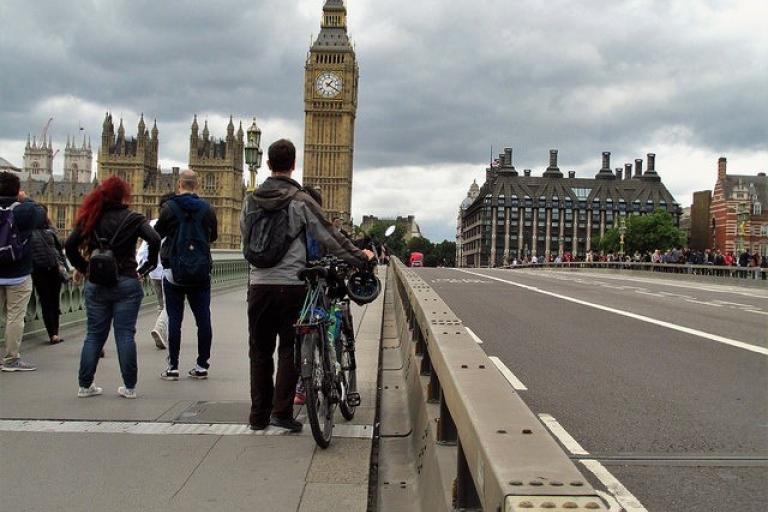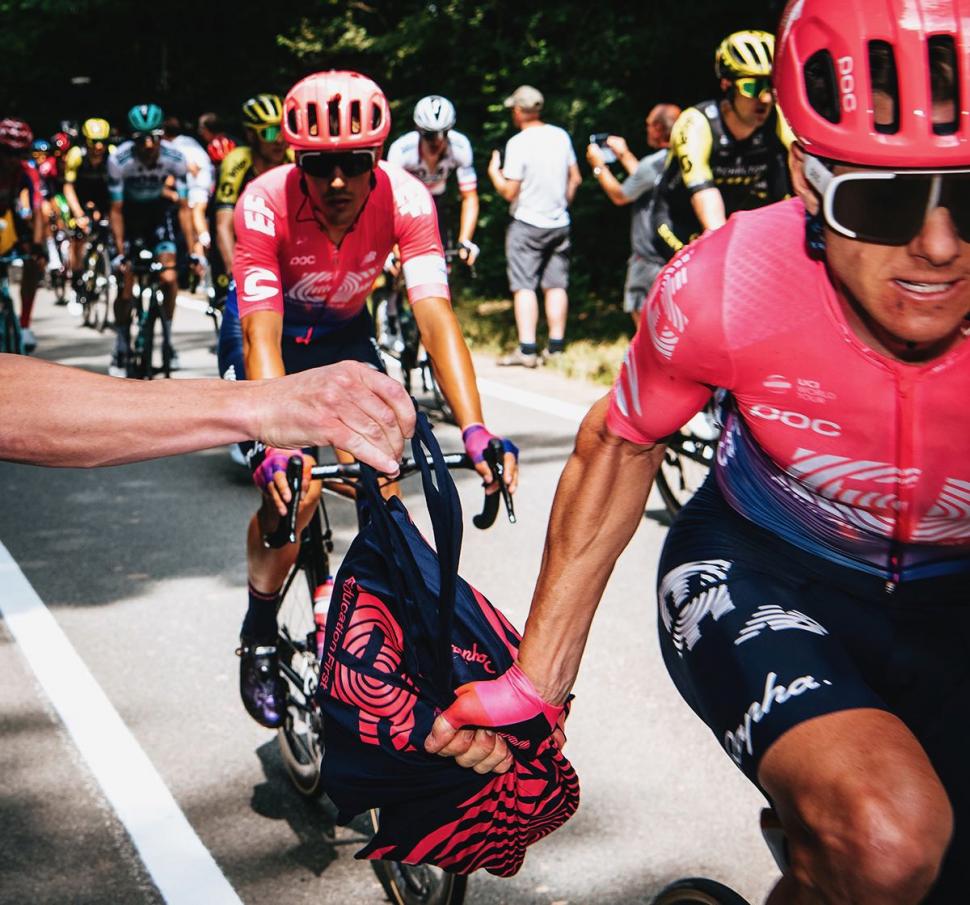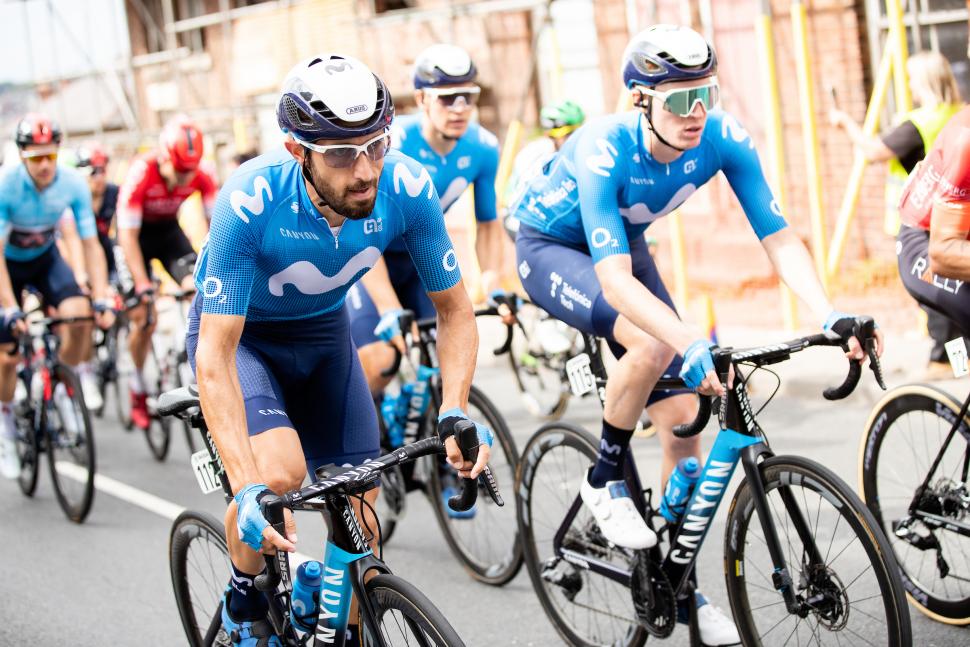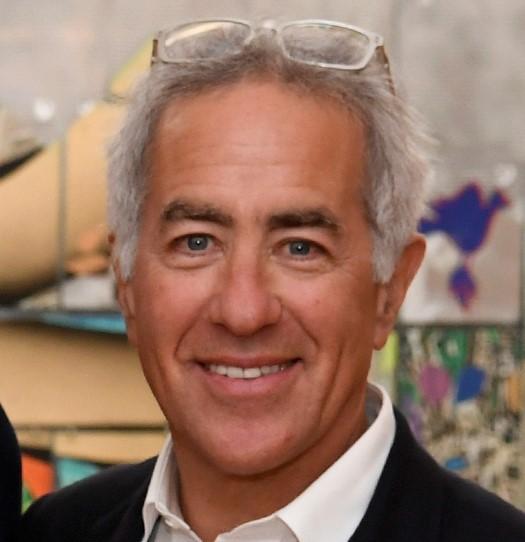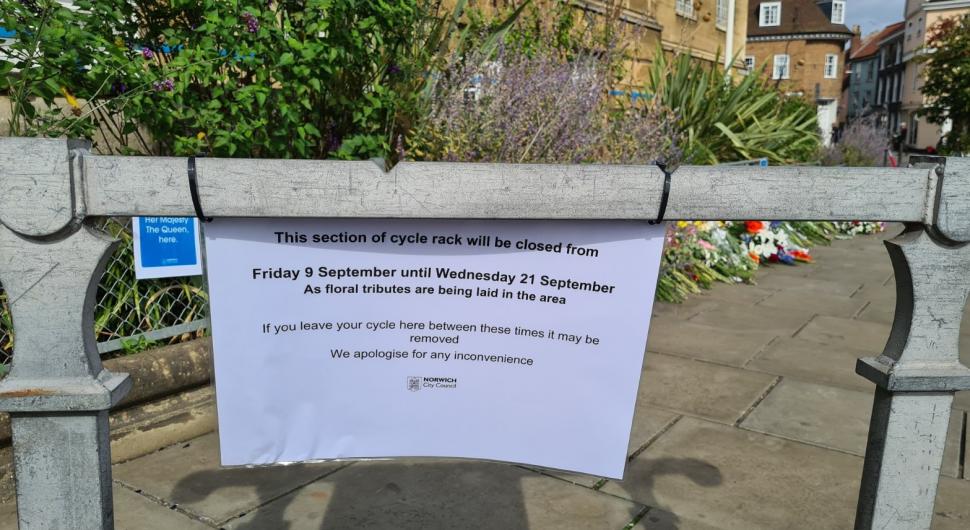- News
- Reviews
- Bikes
- Components
- Bar tape & grips
- Bottom brackets
- Brake & gear cables
- Brake & STI levers
- Brake pads & spares
- Brakes
- Cassettes & freewheels
- Chains
- Chainsets & chainrings
- Derailleurs - front
- Derailleurs - rear
- Forks
- Gear levers & shifters
- Groupsets
- Handlebars & extensions
- Headsets
- Hubs
- Inner tubes
- Pedals
- Quick releases & skewers
- Saddles
- Seatposts
- Stems
- Wheels
- Tyres
- Tubeless valves
- Accessories
- Accessories - misc
- Computer mounts
- Bags
- Bar ends
- Bike bags & cases
- Bottle cages
- Bottles
- Cameras
- Car racks
- Child seats
- Computers
- Glasses
- GPS units
- Helmets
- Lights - front
- Lights - rear
- Lights - sets
- Locks
- Mirrors
- Mudguards
- Racks
- Pumps & CO2 inflators
- Puncture kits
- Reflectives
- Smart watches
- Stands and racks
- Trailers
- Clothing
- Health, fitness and nutrition
- Tools and workshop
- Miscellaneous
- Buyers Guides
- Features
- Forum
- Recommends
- Podcast
news
Charity sportive cancelled as Marie Curie pauses fundraising as “mark of respect” for late Queen; Norwich bike rackgate continues; Team owner threatens UCI with legal action over WorldTour relegation; Mark Beaumont versus NC500 + more on the live blog
SUMMARY
 Tommy Godwin at the 2012 APPCG ride
Tommy Godwin at the 2012 APPCG ride13 September 2022, 16:38
Cycling and the Royal Family: some useless trivia
To mark Charles III’s first visit to Northern Ireland as King today, I thought I’d leave you with some tenuous royal-related cycling trivia…
A pet corgi is among the excited members of the crowd to greet King Charles III, at Hillsborough Castle.https://t.co/Orxz65sc6I pic.twitter.com/UVduaU8sZu
— ITV News (@itvnews) September 13, 2022
Hillsborough Castle, the site of Charles’ first appointment this morning and the only royal residence in Northern Ireland, may be – to the best of my knowledge, though if anyone has more information, please let me know – the only site featured on this royal tour of the UK which has also acted as the venue for a head-to-head, knockout hill climb event.
Yep, back in 2013, the castle’s courtyard marked the finish line of a kind of hill climb meets FA Cup-style competition – held as part of the village’s annual Oyster Festival – where yours truly was knocked out in the first round (it was a close one, I may add).
Also, my dad was one of two local riders who took part in a hastily arranged photoshoot to publicise the event, something I had completely forgot about until today…
If you have any useless royal and cycling trivia of your own, let us know in the comments!
13 September 2022, 15:57
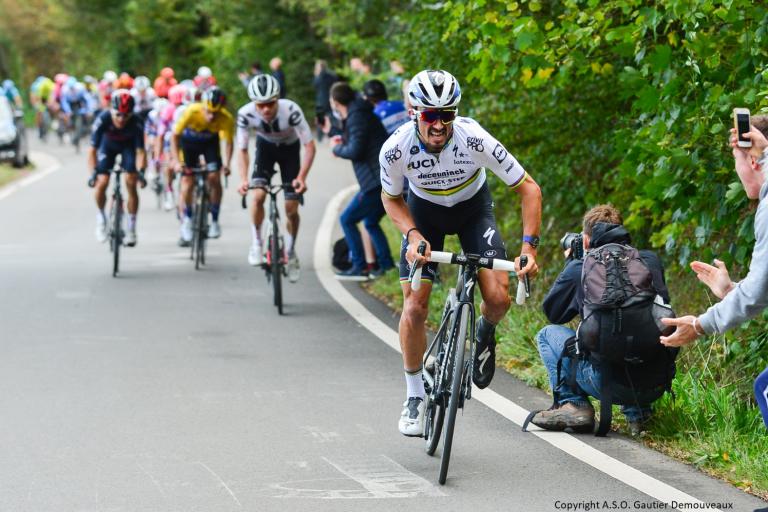
Julian Alaphilippe set for road worlds defence
It’s been an annus horribiliss for reigning world champion Julian Alaphilippe.
After largely avoiding the fabled curse of the rainbow jersey during the first year of his reign, 2022 has hit the flamboyant Frenchman like a tonne of bricks.
A crash at Strade Bianche and a bout of bronchitis scuppered his spring classics preparation, before a horrific crash at Liège-Bastogne-Liège, where he broke two ribs and fractured a shoulder after hitting a tree, derailed the summer. The 30-year-old Quick Step-Alpha Vinyl rider then missed out on selection for the Tour de France due to concerns over his fitness. He looked to be back on track at the Tour de Wallonie in July, where he picked up a stage win, but then contracted Covid.
A last-ditch attempt to resurrect his form at the Vuelta a España quickly turned to dust after another hard crash on stage 11 forced him out of the race with a dislocated shoulder.
👀 Découvrez la sélection tricolore 🇫🇷 pour les Championnats du Monde route du 18 au 25 Septembre à Wollongong en Australie 🌈 pic.twitter.com/7NZIAolENn
— FFC (@FFCyclisme) September 13, 2022
Nevertheless, Alaphilippe has been cleared to race and will travel to Australia at the head of France’s line up for the road world championships in Wollongong next week, as he aims to put a frustrating year behind him by winning a third straight world title.
He will be joined on the men's side by Romain Bardet, Christophe Laporte, Valentin Madouas, Quentin Pacher, Florian Sénéchal, and newly installed French rider Pavel Sivakov, with the time triallists Rémi Cavagna and Bruno Armirail rounding out the selection.
That means there are no spots on the plane for David Gaudu (fourth at this year’s Tour de France), Arnaud Démare, Guillaume Martin, and Thibaut Pinot, while Benoît Cosnefroy also misses out, after going straight to the top of my favourites list following a superb solo win at the GP Quebec.
Shows how much I know…
13 September 2022, 15:28
50 quid for disc brake pads? AbsoluteBlack strikes again
You may remember AbsoluteBlack, the oval chain ring manufacturer which has also tried its hand at oversized pulley cages (the ostentatious design of which are backed up by the equally flashy £500-plus price tag) and some eye-wateringly expensive chain lube (yours for the low, low price of £115. Gulp.).
Well AB has struck again, releasing a range of disc brake pads that they say mark a “new era of braking confidence and consistency”.
Three years in the making, AbsoluteBlack’s GRAPHENpads (the novelty of the oh-so-modern letter case wears thin after a while, hopefully not like the brakes) apparently offer the “perfect combination” of power, internal bite and modulation through long descents.
The striking design, AbsoluteBlack says, is also proven to reduce disc pad and rotor temperature by up to 35 percent compared to its rivals, while also completely eliminating brake fading.
And the price? Just the 50 quid this time…
Blimey, my first carbon bike was cheaper than AbsoluteBlack’s brake pads, pulley cage and lube. Each to their own, I suppose.
13 September 2022, 15:15
13 September 2022, 14:59
British Cycling: Don’t ride your bike during Queen’s funeral
eh? @BritishCycling pic.twitter.com/3ADW2hlp98
— Jack Thurston (@jackthurston) September 13, 2022
Stay tuned to the homepage for more on this story soon…
13 September 2022, 15:01
13 September 2022, 14:24
“The whole relegation idea is such bullsh*t”: road.cc readers – and Dan Martin – weigh in on pro cycling’s hottest debate
After Sylvan Adams – the co-owner of beleaguered WorldTour team Israel Premier Tech – criticised the UCI’s new promotion and relegation system for its flagship WorldTour, some of you were keen to air your views on the current hot topic in professional cycling.
EF Education-Easypost, one of the teams battling the drop this year
Espressodan, for instance, was rather blunt in his assessment of the UCI’s latest dubious attempt to mix things up (remember the ProTour wars of the mid-2000s? Ah, great times).
“The whole relegation idea is such bullshit,” he says. “It's not like pro teams have deep roots in cities or multi-generation loyalty. Any sponsorship contract will only be as good as long as the license is held. Relegation means big sponsors will leave, teams will fold, and then the sponsor will just pickup a new pro tour team, so it'll be '2023 Lotto, not 2022 Lotto'.
“The good pros will find new teams, struggling pros will end up on Continental squads. The people who will be really hurt will be the staff, who'll face redundancy. It doesn't feel like the UCI really thought this through.”
RobD agreed, writing: “It doesn't feel like cycling is a strong enough sport financially that there are lots of teams knocking on the door to get involved in the WorldTour.
“So what happens if one of the teams that gets promoted has its title sponsor pull out causing the team to fold? Does the WorldTour continue with 17 teams? Or does one of the relegated teams get offered the chance to return, having lost most of their headline riders?
“It feels like the UCI should be working on shoring up the stability of the sport, perhaps promoting the coverage of some of the smaller races and women's racing rather than trying to get on with the advanced planning.”
Actualización del descenso: Movistar sale de #LaVuelta22 prácticamente salvado, con solo un 1% de probabilidades de descender.
Israel ya casi ha muerto y mi modelo pronostica que el otro descendido estará entre Lotto, Cofidis y BEX.
Análisis completo con gráficos exclusivos 👇
— Raúl Banqueri (@raulbanqueri) September 12, 2022
SimoninSpalding noted that the “flipside of the argument is without relegation how do new teams get access to the big races? I think the flaw is in the criteria that are used. It should not just be about UCI ranking points but also what the team is doing for the sport in terms of supporting and developing young riders, women's racing etc.
“Unfortunately, this would also not suit Israel Premier Tech and other billionaire vanity projects employing over the hill pros in the hope that the TV will pick them out in the bunch to prove that Chris Froome hasn't been dropped yet...
“Sylvan Adam's team has brought nothing to the sport or the spectacle of professional racing and I for one would much rather see an exciting new team join the WorldTour with a bunch of neo-pros that no-one has ever heard of.”
Harsh words if you’re a fan of scanning the bottom third of the bunch on the second categorised climb of the day, though rather pertinent when you take into consideration Israel Premier Tech’s bang for their buck in recent years.
Meanwhile, monument winner-turned-social media commentator Dan Martin had his say on both the length of the WT licences handed out and the impact the new system may irrevocably have on week-long stage races, the bread and butter of the cycling calendar:
A relegation/promotion system could work in cycling to expand the number of teams but it has to be an annual process like in other sports, give teams the chance to rebuild or even develop quickly. Have a good season and get in the WorldTour as reward. 3 years is too long.
— Dan Martin (@DanMartin86) September 13, 2022
The current @UCI_cycling points system could legitimately kill off stage racing as it is so heavily weighted towards 1 day races. GP Fourmies the same points as the 8 day @TourofBritain with very few points for stage victories and a much longer recovery time for example.
— Dan Martin (@DanMartin86) September 13, 2022
The point that is missed is that since the WorldTour’s inception, there have never been more than 18 teams interested in WT status. Now we have 20. Challenge is to continue building the sport and how to accommodate more high level teams rather than restrict to 18.
— Dan Martin (@DanMartin86) September 13, 2022
The solution? Bring back the Super Prestige Pernod, I say…
13 September 2022, 14:04
Turn around… so every now and then you won’t be doored by a portaloo patron
13 September 2022, 13:49

Tommy Godwin charity sportive cancelled as Marie Curie suspends fundraising activities as “mark of respect” for late Queen
The popular Tommy Godwin Challenge sportive, which raises money for the West Midlands Marie Curie Hospice in Solihull, has been cancelled due to the charity’s suspension of fundraising activities during the current national period of mourning.
The sportive was established in 2013 to honour the memory of former British Cycling Federation president Tommy Godwin, a double Olympic medallist in London in 1948 and an ambassador and torch bearer for the 2012 Games.
Since then, the event – which offers routes ranging from 30km to 100km, as well as a retro bike ride – has raised over £120,000 for the Marie Curie Hospice in Solihull, where Godwin was cared for before his death in November 2012, at the age of 91.
However, the challenge’s organisers yesterday announced that the 2022 edition, which was scheduled to take place on Sunday 18 September, has been cancelled following Marie Curie’s request to pause all fundraising activities during the national period of mourning following the death of Queen Elizabeth II.
The Solihull Hospice, which acts as the event’s headquarters, is also unavailable for use this week, forcing the organisers to cancel.
“It is with regret that our event on Sunday 18th September is cancelled,” the organisers have said in a statement.
“The 2022 Tommy Godwin challenge is scheduled to be held the day before the funeral of Queen Elizabeth II. The new King, Charles III, is the royal patron of Marie Curie and as a mark of respect the charity has requested a cessation of all fundraising activities during the period of national mourning.
“Additionally, we cannot have access to use the Solihull Hospice site as HQ during this period. Sadly therefore, for circumstances outside of our control, the 2022 event is cancelled.”
With great regret 2022 @TommyGodwin1 on 18 Sept.has been CANCELLED
The event was due to be held day before the funeral of Queen Elizabeth II & as a mark of respect to their patron King Charles III executives of Marie Curie have asked for a cessation of all fund raising activities— TommyGodwinSportive (@TommyGodwin1) September 12, 2022
The organisers also confirmed that participants will be refunded, but that they can also donate their entry fees to Marie Curie if they wish.
“The death of the Queen and the period of mourning is a difficult time for us all, and for many it brings back memories of our own personal grief,” they said.
“The Tommy Godwin organising team thank all riders, volunteers and sponsors for supporting our fundraising during 2022.”
Thanks to road.cc reader Ian for flagging this story in the comments.
13 September 2022, 12:55

House of Jumbo CEO raided as part of fraud investigation
So it turns out that Primož Roglič’s questionable attempt to blame Fred Wright for his Vuelta-ending crash has already been usurped in the PR disaster stakes for the Slovenian’s team sponsor Jumbo.
Several Dutch media outlets have reported that the home of the Dutch supermarket chain’s CEO, Frits van Eerd, has been raised this morning by Dutch police and the Fiscal Intelligence and Investigation Service (FIOD).
According to reports, the raid, which was authorised by the Public Prosecution Service Northern Netherlands, was carried out as part of an investigation into money laundering and VAT fraud. Nine people have been arrested in the regions of Drenthe and North Brabant, though Van Eerd does not appear to be among those in custody.
It is currently unclear what effect the raids and ongoing investigation will have on the supermarket chain’s co-sponsorship of the Jumbo-Visma men and women’s WorldTour teams, as well as the organisation’s development squad.
13 September 2022, 12:17
13 September 2022, 11:32
Bizarre anti-cycling Facebook comments, royal edition
"Perhaps we could suggest that all cycle lanes are closed throughout the period of mourning. I think the Queen drove Land Rovers rather than riding bicycles so it would be a mark of respect."
— Stupid shit people say on Facebook about cycling (@AntiCyclingFB) September 13, 2022
Perhaps the originator of this frankly inexplicable comment would prefer if the cycle lanes were simply replaced by lines of portaloos?
Anyway, the below reply proves that there’s always a photo for everything:
Return to the scene of this verbal bollox and reply with this. pic.twitter.com/h7MF19ns6Q
— Tommy (@Wombletom) September 13, 2022
13 September 2022, 10:51
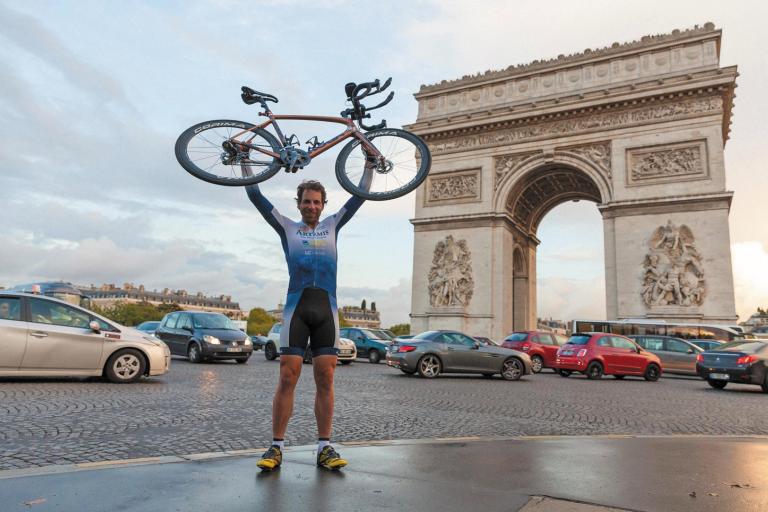
Mark Beaumont to attempt to win back North Coast 500 record
Around-the-world Guinness World Record holder Mark Beaumont is aiming to regain another of his long-distance cycling records – by taking on the iconic North Coast 500 route in the Scottish Highlands in two weeks’ time.
The current record for the NC500 was set last year by Robbie Mitchell, who completed the 516-mile trek in a staggering 29 hours, five minutes and 42 seconds, raising money for the Edinburgh Sutherland Association in the process.
Mitchell smashed Josh Quigley’s previous record of 31 hours, 19 minutes and eight seconds by more than two hours, and was six hours faster than the time set by Beaumont when he broke the record in 2015.
> Robbie Mitchell smashes NC500 record by more than two hours
Now, Beaumont is looking to regain his title on what the Edinburgh-based rider describes as “my favourite endurance route in the UK”.
“It’s a stunning part of Scotland and it’s incredibly difficult,” he told the Scotsman.
“I’m not going into it thinking I can just crack that and get the record back. I want to do things where it’s hard enough for the outcome to be unknown.
Beaumont during his last NC500 attempt, in 2015
“I like things which are just out of reach and you’ve really got to put everything on the table in terms of performance and logistics to be able to do it.”
Beaumont, who will take on the challenge on an Argon 18 TT bike and accompanied by a GCN+ documentary crew, says the toughest part of the route will be the “absolutely stunning but brutal” section between Lochinver and Durness in the north west.
“Everyone talks about the Bealach na Ba, one of the most fearsome climbs in the UK – otherwise known as the Applecross pass – but it is just 600m up and 600m down,” he says.
"It’s a long, gradual climb so it’s not that scary for a professional athlete. You just push up it.
“The roads further north are nowhere near as impressive in terms of climbing mountains, but they’re just constantly steep inclines and declines.
"You can never hold a pace or stay in a gear for longer than a minute. It’s just unrelenting.”
The endurance rider continues: “I’ve watched in awe and with interest as the record I set in 2015 has been broken time and time again.
“I love seeing that – where people take something I have been involved in and raise it to the next level.
“I’ve always loved the broadcasting element. It’s equally as important as the record breaking because you can leverage that personal ambition to inspire people to explore Scotland, get out on their bikes and push for their own dreams.
“That’s a big motivation for me – and hopefully we can break the record and tell an inspiring story.”
13 September 2022, 10:03

“Relegation is death”: Israel Premier Tech owner threatens UCI with legal action over WorldTour relegation battle… and even jokes he’ll set up his own Tour de France
Ah, the WorldTour relegation battle. The UCI’s controversial and rather confusing attempt to soccer-ify professional cycling – by basically adding even more jeopardy to the sport’s already fragile sponsor-focused economic model – hasn’t gone down too well with those at the bottom of the pile, who are now facing the prospect of a precarious financial future outside of cycling’s elite level.
One of those increasingly nervous team owners in Israel Premier Tech’s Sylvan Adams, the winner of the points race at the 2015 UCI Masters track worlds, who believes that the new promotion and relegation system will ‘destroy’ pro cycling.
Introduced by the UCI in 2018, the new system will take into account the accumulated end-of-season points rankings during the past three years when issuing WorldTour licences for 2023. A WorldTour licence guarantees teams invites to the most prestigious top-tier races, including – of course – the Tour de France, which in turn guarantees the most exposure for sponsors and equipment suppliers.
While most squads appeared to take little notice of this seismic change to the way elite cycling is structured for much of the past three Covid-impacted years, 2022 has witnessed a number of increasingly desperate attempts to stay above the red line, with its potentially cataclysmic economic outcomes.
Some teams have been accused of ‘gaming the system’ throughout the 2022 season by sending their riders to smaller, less prestigious one-day races that – critically – carry more valuable UCI points than single stages or minor GC placings in traditionally more important stage races (another kink in the UCI’s ranking system that has drawn the ire of sweating team owners).
The looming threat of relegation has prompted various squads, including Movistar, to ban their riders from travelling to the upcoming world road race championships in Australia, where the prospect of jetlag could scupper the team’s hopes of picking up points during the closing stages of the season.
SWpix.com
The spate of Covid positives at the recent Vuelta a España also led to the withdrawal of top-ten contender Simon Yates, the leader of the relegation-threatened BikeExchange-Jayco squad, who were banking on the British rider’s points in Spain to help save them from the drop.
Israel Premier Tech’s Adams is one of many critics of the UCI’s system to point to Covid – and its clear impact on the outcome of races – as the primary reason to postpone, or at least alter, the governing body’s plans for 2023.
Adams, whose team is the most likely to fall victim to the dreaded trapdoor after a barren few years reliant upon aging big names on even bigger salaries, believes that the pandemic necessitates a ‘force majeure’, a legal concept which frees both parties to a contract from an obligation if an extraordinary event prevents one or both parties from performing.
“A world pandemic is the definition of ‘force majeure,'” the billionaire real estate developer told VeloNews.
“And there’s been a pandemic during the full three years of the relegation process. If it was just the first season, OK, maybe, but we’ve been hit more this year by it than in 2020.”
Adams says that the UCI should expand the WorldTour from 18 to 20 teams for 2023, allowing Arkéa-Samsic and Alpecin-Deceuninck to move up, while enabling all current WT squads to retain their topflight status (while also reducing the Tour de France’s wild card slots to two from four).
If not, the Israel Premier Tech co-owner says he may have to pursue the matter in the courts.
“Who is hurt by this idea of going to 20 teams? Nobody.
“Relegation is death. It doesn’t matter which of the two teams end up being relegated. It’s an existential problem.
“Why are we destroying rather than building? It’s as simple as that. I hope that common sense prevails.
“To threaten our team and the other teams with this relegation, it’s just so harmful, and I don’t see the purpose of it.
“I don’t see what’s to be gained. We have 20, maybe 21 teams who have the budget to be WorldTour. Other sports encourage expansion. This is destructive.”
Zac Williams/SwPix.com
The 63-year-old, who also joked that he may have to set up a 'rival' Tour de France if his team is denied an invite to the sport's biggest event, continued: “I am still hopeful that we will still end up on the right side of relegation, although it’s looking worse and worse. Even if we did, I don’t want to see those other teams disappear.
“I don’t want to see the end of Movistar, EF, or Bike Exchange. Why?
“And if I lose, I am going to take them to court. If I lose my sponsors and it costs me millions, somebody has to make me whole. If I show that they do not apply the rules consistently, I think I have a very good case.
“I am claiming ‘force majeure'. I know why we are struggling for points this year, it’s because of the pandemic. We’ve lived through strange times. I loathe litigation. Nobody wins in litigation, only lawyers win. If they put me in this situation of causing terrible damage, I will explore all of my options.
“I’m an optimist,” he concluded. “There’s no trouble that’s worse than relegation. Relegation is destruction.”
As the 2022 season begins to wane and in the midst of growing concerns, such as those voiced by Adams this week, about the impact of relegation on some of cycling’s longest standing teams, the UCI double downed on its commitment to the new licence-granting system last week.
The governing body pointed out that cycling’s major stakeholders all agreed to the structural change in 2018, and also noted that agreement was reached at the end of 2020 to include the rankings for that first Covid-affected season as part of the overall promotion and relegation tallies.
13 September 2022, 09:34
‘But look at all the empty bike lanes!’
Funny how 'some people' complain that 'unused cycle lanes' take road width away from moving vehicles and 'create traffic'.
But they never once mention all the millions of 'unused vehicles' parked at the side of the road; taking road width away from moving vehicles.
— Adam Bronkhorst (@AdamBronkhorst) September 13, 2022
Roughly 3000 miles of parked cars on roads in London compared to about 65 miles of cycle lanes.
— steve abraham 💙 (@steve_abraham74) September 13, 2022
13 September 2022, 08:01

Norwich bike rackgate: Council alters controversial notices and says bike racks have been closed so cyclists don’t damage floral tributes
Just when you thought it was safe to browse the internet without hearing about a bike rack in Norwich…
Following yesterday’s lengthy (some might say interminable) discussion on the live blog about the rights and wrongs of the decision to put two bike racks located at Norwich City Hall out of action for the entire 12-day ‘royal period of mourning’, Norwich City Council has finally responded to this complex and vexing issue that has, quite rightly, dominated the national news cycle over the past 24 hours.
While the original signs simply warned cyclists that their bikes would be removed from the cycle racks at the City Hall if left there anytime between last Friday and next Wednesday, new notices have gone up clarifying that the racks are closed “as floral tributes are being laid in the area” (one of the altered signs was spotted yesterday by road.cc reader and roving reporter Terry).
Also, just as Terry noted in his eyewitness report for the blog, a second rack has been closed to enable part of the footpath to be roped off in anticipation for the queues of royal mourners wishing to sign the council’s book of condolences.
Responding to the online confusion surrounding the closed bike racks, a spokesperson for Norwich City Council said: “As part of our careful and respectful response to the passing of Queen Elizabeth II we have closed one cycle rack outside City Hall which is within the designated area where people can lay their floral tributes.
“The sign is in place to help ensure the flowers that people have so carefully laid in place to pay tribute to the Queen aren’t damaged by people accessing their bicycles.
“Similarly, a second bike rack outside City Hall is also closed as this is in the area where people queue to sign the book of condolence to the Queen. All other cycle racks in the city remain open, including those just a few feet away from City Hall.
“To clear up any misunderstanding, we’ve replaced the signs with new ones to make things a little clearer.”
Well, that’s that cleared up then. But don’t worry, we’ve still got eight days to go…
After obtaining a PhD, lecturing, and hosting a history podcast at Queen’s University Belfast, Ryan joined road.cc in December 2021 and since then has kept the site’s readers and listeners informed and enthralled (well at least occasionally) on news, the live blog, and the road.cc Podcast. After boarding a wrong bus at the world championships and ruining a good pair of jeans at the cyclocross, he now serves as road.cc’s senior news writer. Before his foray into cycling journalism, he wallowed in the equally pitiless world of academia, where he wrote a book about Victorian politics and droned on about cycling and bikes to classes of bored students (while taking every chance he could get to talk about cycling in print or on the radio). He can be found riding his bike very slowly around the narrow, scenic country lanes of Co. Down.
Add new comment
36 comments


espressodan
|
2 years ago
1 like
The whole relegation idea is such bullshit. It's not like pro teams have deep roots in cities or multi-generation loyalty. Any sponsorship contract will only be as good as long as the license is held. Relegation means big sponsors will leave, teams will fold, and then the sponsor will just pickup a new pro tour team, so it'll be '2023 Lotto, not 2022 Lotto'. The good pros will find new teams, struggling pros will end up on Continental squads. The people who will be really hurt will be the staff, who'll face redundancy.
It doesn't feel like the UCI really thought this through.
The flipside of the argument is without relegation how do new teams get access to the big races? I think the flaw is in the criteria that are used. It should not just be about UCI ranking points but also what the team is doing for the sport in terms of supporting and developing young riders, women's racing etc. Unfortunately this would also not suit Israel Premiertech and other billionaire vanity projects employing over the hill pros in the hope that the TV will pick them out in the bunch to prove that Chris Froome hasn't been dropped yet...
Sylvan Adam's team has brought nothing to the sport or the spectacle of professional racing and I for one would much rather see an exciting new team join the World Tour with a bunch of neo-pros that no-one has ever heard of.

I agree, it doesn't feel like cycling is a strong enough sport financially that there are lots of teams knocking on the door to get involved in the world tour. So what happens if one of the teams that gets promoted has it's title sponsor pull out causing the team to fold? does the world tour continue with 17 teams? or does one of the relegated teams get offered the chance to return, having lost most of their headline riders?
It feels like the UCI should be working on suring up the stability of the sport, perhaps promoting the coverage of some of the smaller races and women's racing rather than trying to get on with the advanced planning.

I might be wrong in this regard, but I don't think so.
In football, promotion to the premier league brings great riches from TV rights. In cycling, promotion brings huge bills and obligations to field teams all over the place - that means newly promoted teams need to find sponsors with deep pockets quickly. The sponsors of relegated teams wonder if their money is being well spent if they're now in the headlines for relegation and most will find someting else, or spend less at Pro-conti level (Alpecin.DK for example).
It's a shame because despite an overall lack of success, Lotto Soudal, for example, are alway entertaining. How many yougsters have looked around them when the break settles down and found their souls filling with dread that they're taking turns with Thomas de Gent.....

IanMSpencer
|
2 years ago
9 likes
The Tommy Godwin* Sportive has been cancelled. The reasoning is a bit peculiar.
"The 2022 Tommy Godwin challenge is scheduled to be held the day before the funeral of Queen Elizabeth II. The new King, Charles III is the royal patron of Marie Curie and as a mark of respect the executives of Marie Curie have requested a cessation of all fundraising activities during the period of national mourning. Additionally, we cannot have access to use the Solihull Hospice site as HQ during this period."
It seems to say fundraising for a cancer hospice is disrespectful???
*Solihull Tommy


Hirsute
|
2 years ago
4 likes
Just waiting in a queue at an ASL - what could possibly go wrong ?
https://twitter.com/n00dles71/status/1569596592067313668




Have you seen martin then ?
He made a complete fool of himself over the pedestrian death case in Manchester, making a celebratory forum post which made it clear that he thought a guilty verdict was guaranteed and getting ready to crow about it with his usual "cyclists are the most dangerous on the roads" schtick. He hasn't been back since, I fully expect him to be pitching up some point next week claiming he was refraining from posting as a mark of respect for HMQ.


billymansell
|
2 years ago
8 likes
Here's a crazy idea but instead of councils being enablers of those buying and placing of pointless flowers why aren't people being encouraged to give the money to charity?
Placing flowers which block footpaths and will only generate waste is an utterly absurd thing to encourage. If people want to do something in memory of the Queen then do something of lasting benefit to those still alive who may be less fortunate.
Bah humbug!

Here's a crazy idea but instead of councils being enablers of those buying and placing of pointless flowers why aren't people being encouraged to give the money to charity?
Placing flowers which block footpaths and will only generate waste is an utterly absurd thing to encourage. If people want to do something in memory of the Queen then do something of lasting benefit to those still alive who may be less fortunate.
Bah humbug!
Yeah, but it's tricky to have a photo opportunity of someone donating to charity. The only purpose to leaving flowers is so that other people can see you doing it.

Sorry to disagree with you Pete, but in this case I'd argue with the notion that "The only purpose to leaving flowers is so that other people can see you doing it." Sure, for some it will be about the photo. op., but for many it will be a genuine mark of respect, and intended to add to the impresssion of community respect that anyone seeing the accumulated tributes will understand. Put in another context, how many people place flowers on the graves of loved ones for the photo. op.?
The Palace has asked for donations to charity rather than floral tributes, but however "wasteful" in a practical sense I do understand people adopting this traditional method of showing respect for the departed
It isn't just the moment of placing the flowers, it is the possibility that a news crew might linger on their profound and heartfelt (cliched and overblown?) expression of grief, or even that an actual member of the family might walk quite close to their bouquet. It is the equivalent of wearing a jester's hat and carrying a flag at Glastonbury or going to the football dressed as a Roman centurion.




Pages
Latest Comments
- Iwein Dekoninck 7 min 34 sec ago
I don't have an older / longer Rapha jersey to compare to, but I thought the length was spot on, certainly not short like some of the aero jerseys.
- quiff 10 min 47 sec ago
Hello Only for one year, but I loved GCN+ because it was what I wanted (cycling) plus a bit more of what I wanted (cycling documentaries) and...
- brooksby 46 min 25 sec ago
WHY did this bloke throw a full water bottle at VDP? Who goes to a major sporting event and thinks to themself, "You know what - I think I'll try...
- Dnnnnnn 56 min 17 sec ago
"With the six-month review of the scheme now approaching"... LOL. The scheme they prevented implementation of for almost six months....
- Rendel Harris 1 hour 8 min ago
Especially as apparently his Di2 managed to mistake the shaking from the cobbles of the Arenberg as a crash and went into crash mode, locking him...
- wtjs 1 hour 11 min ago
APPGs (not just this one) are pretty low down the influence ladder...
- Gus T 1 hour 50 min ago
Don't forget that the Tariffs will still apply to the imported raw materials and parts so are of no benefit to the US consumer. Americas burns...
- Gus T 1 hour 58 min ago
My wife & I visited Bristol for the 1st time a couple of weeks ago, I was amazed at the congestion caused by the number of single occupancy...
- hawkinspeter 2 hours 37 min ago
https://www.bristolpost.co.uk/news/bristol-news/live-bus-crashes-bridge-bristol-10103689 That bridge really needs some hi-viz
- Rendel Harris 3 hours 3 min ago
"However, one passenger on the bus at the time of the collision, Victoria Lester, who was sitting "right behind the bus doors" reported Lucas's...
